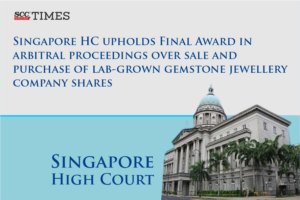Singapore High Court: The Bench of Chua Lee Ming J.*, while considering an application for setting aside an arbitral award vis-à-vis proceedings concerning the sale and purchase of shares of a company that owned a piece of lab-grown gemstone jewellery, upheld the award stating that the applicant (DDI) could not prove the allegations that the award was affected by excess of jurisdiction, bias, and was in breach of the principles of natural justice. It was held that the Arbitrator’s award was not tainted by any of the allegations so made and ordered the applicant to pay costs to the respondents.
Background
An application to set aside an arbitral award derived from the arbitral proceedings between the applicant and respondents, under Section 48 of the Arbitration Act 2001 (2020 Revised Edition) (“Act”) was brought before the Court by the applicant on the grounds of excess of jurisdiction, bias, and the breach of the rule of fair hearing.
The dispute subject to arbitration was regarding the sale and purchase of shares in a company who were the owners of a piece of jewellery that was named after and endorsed by a celebrity. The Sale and Purchase Agreement (“SPA”) between the parties provided for all disputes to be resolved by arbitration administered by the Singapore International Arbitration Centre (“SIAC”).
In 2021, the Court of Arbitration of SIAC appointed the applicant’s nominee as the sole arbitrator, and in 2023, the Arbitrator had issued the Final Award.
Issues before the Court
-
Whether the Arbitrator exercised excess of jurisdiction?
-
Whether the applicant was prevented from being heard?
-
Whether the principles of natural justice not followed by the Arbitrator?
Analysis and judgment
Considering the first issue, the Court referred to the case of CJA v. CIZ1, to determine whether an arbitral award suffers from an excess of jurisdiction. A two-stage enquiry was subscribed to-
-
The Court must identify what matters were within the scope of submission to arbitration.
-
The Court must determine whether the arbitral award involved the abovementioned matters or dealt with some new matters and whether the same was within the scope of submission to arbitration.
Regarding the second issue, the Court said that under Section 48(1)(a)(iii) of the Act, an award may be set aside if a party was unable to present his case. However, in the instantt case, the applicant failed to show that there was prejudgment or bias against them by the Arbitrator, thereby failing in his challenge under Section 48.
Concerning the third issue, the Court said that it is not its function to scrutinise an arbitral award microscopically rather, an award should be read generously such that only meaningful breaches of the rules of natural justice that have caused prejudice are ultimately remedied. The breach should be such that the final outcome of the arbitral proceedings is altered.
The Court referred to Soh Beng Tee & Co. Pvt Ltd. v. Fairmount Development Pvt Ltd.2, and stated that the two pillars of natural justice were the rule against bias, and the fair hearing rule. The Court also referred to BOI v. BOJ3, wherein the Court of Appeal stated the determining test for bias is whether there are circumstances that would give rise to a reasonable suspicion or apprehension of bias in the fair-minded and informed observer. Therefore, the Court stated that an award may be set aside under Section 48(1)(a)(vii) of the Act for breach of the rules of natural justice only if the breach has caused prejudice, that must be actual or real.
Concerning the applicant’s argument about the Arbitrator’s leading questions, the Court noted that it would have been preferrable if the Arbitrator had asked open questions instead of leading ones, however, that does not lead to conclusion that the Arbitrator was biased. The Court was of the view that the Arbitrator as the peruser of evidence presented, had questions to clarify the same, and the raising of questions to did not mean that the Arbitrator had undertaken an inquisitorial role beyond their judicial function.
Therefore, in the light of the evidence and arguments, the application to set aside the Final Award was dismissed and the applicant was ordered to pay the costs of $25,000 and additional disbursements to the respondents, by the Court.
[DDI v DDJ [2024] SGHC 68, decided on: 14-03-2024]
Judgment by Justice Chua Lee Ming
Advocates who appeared in this case :
Advocates for the Applicant: Ho Pei Shien Melanie, Chang Man Phing Jenny, Tang Shangwei, Goh Sher Hwyn, Rebecca
Advocates for the Respondents: Devathas Satianathan, Yeo En Fei, Walter and Thawdar Soe Moe
1. 2 SLR 557
2. [2007] 3 SLR(R) 86
3. [2018] 2 SLR 1156

